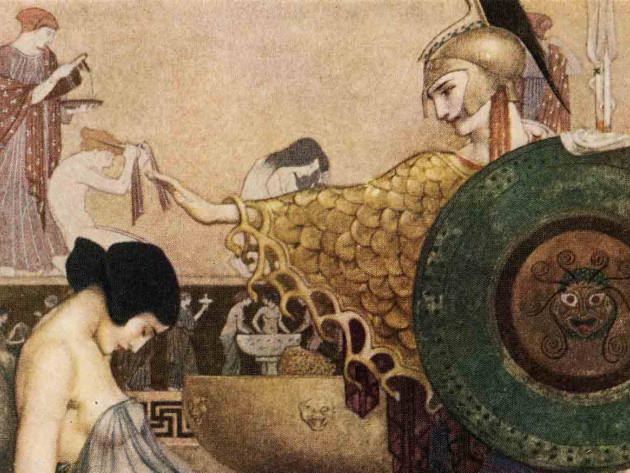
The exhibition entitled Penelope, curated by Alessandra Sarchi and Claudio Franzoni, opens to the public in the spaces of the Uccelliere Farnesiane (Farnesian Aviaries) and the Temple of Romulus, within the archaeological area of the Roman Forum and Palatine Hill. The exhibition, through around fifty works, including paintings, sculptures, reliefs, incunabula and printed books, vases - including the famous Attic skyphos from the 5th century B.C. of the "Penelope Painter" of the National Etruscan Museum of Chiusi - or in the many paintings and engravings of the modern era, restores the different aspects of the figure of Penelope, retracing her myth and fortune emerging from the remote age of the Homeric poems, is presented to us through literary tradition and figurative art; the exhibition, promoted by the Colosseum Archaeological Park, is the first dedicated to this important Homeric character.
Emblematic figure of Greek mythology, known above all for her loyalty to her husband Ulysses (Odysseus), king of Ithaca, her story is told mainly in the Odyssey, the famous epic poem attributed to Homer, in which Penelope embodies the ideal of the devoted and wise wife. During the twenty years of Ulysses' absence, engaged first in the Trojan War and then in the long return journey, Penelope becomes the guardian of her palace-home in Ithaca, also obedient to her twenty-year-old son Telemachus.
In order to protect the kingdom and herself in fact, Penelope devises a cunning stratagem: she promises to choose a new husband only after having finished weaving a shroud for Laertes, Ulysses' father. However, at night she secretly undoes what she has woven during the day, thus managing to deceive her suitors for three years. The figure of Penelope, a symbol of loyalty and intelligence, patience and wisdom, has had a great influence not only in literature, but also in art and throughout all Western culture. Often represented intent on weaving or dismantling the loom, her image returns in various works of art, from Renaissance painting to contemporary sculpture.
Furthermore, the exhibition itinerary also pays homage to one of the greatest Italian artists of the twentieth century: Maria Lai. The exhibition includes a tribute to the work of this artist, known for having brought textile art to the centre of the contemporary art scene. Thanks to the collaboration with the Archive and the Maria Lai Foundation, Maria Lai's works dialogue with the myth of Penelope, creating a bridge between the ancient and modern worlds.
The exhibition is accompanied by the catalog published by Electa, conceived, due to the richness of the contributions entrusted to the major specialists with a focus on various aspects and chronologies, as an exhaustive volume - and still missing in the publishing panorama - on the mythical yet so current figure of Penelope and on its success in Western culture up to the present day.
Finally, on the occasion of the exhibition, the Colosseum Archaeological Park promotes the program of meetings Existing as a Woman. Dialogues and lessons on women, artists, battles and female archetypes conceived and created by Electa with Fondazione Fondamenta and with Alessandra Sarchi and Claudio Franzoni. The meetings will be held in the Roman Forum at the Curia Iulia, starting from September 21st, and until December.
Photo credits: Athena puts Penelope to sleep, illustration from The Odyssey of Homer done into English prose by S.H.Butcher and Andrew Lang, ill. Sir William Russell Flint, the Medici Society, London 1924 - official website of the Colosseum Archaeological Park
Informaciones
Dal 19 settembre 2024 al 19 gennaio 2025
presso le Uccelliere Farnesiane e del Tempio di Romolo
 Condividi
Condividi











































